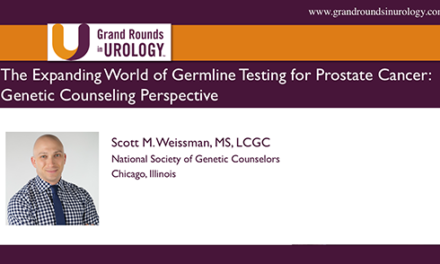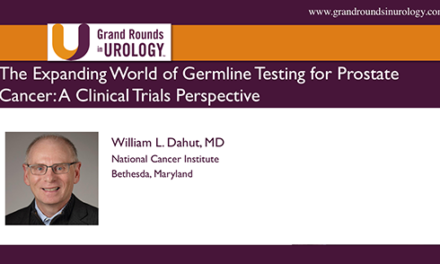Daniel W. Lin, MD, and Eric A. Klein, MD, presented a special three-part Point-Counterpoint on “Point-Counterpoint: Oncotype Dx Genomic Prostate Score in Active Surveillance – Canary PASS Study” for the Grand Rounds in Urology audience in April, 2020 to discuss their differing viewpoints on the results of the Canary PASS cohort, and the extent to which those results support the ability of the Oncotype DX genomic prostate score (GPS) to measure adverse pathology in prostate cancer patients. Dr. Lin and Dr. Klein also discuss several follow-up questions related to the study and, more broadly, the future of prostate cancer treatment with E. David Crawford, MD, Editor-in-Chief of Grand Rounds in Urology.
After viewing the three presentations, be sure to vote on which presenter’s view you support.
Point-Counterpoint – Pro: Oncotype Dx Genomic Prostate Score in Active Surveillance – Canary PASS Study – Summary:
Daniel W. Lin, MD, Pritt Family Endowed Chair for Prostate Cancer Research at the University of Washington School of Medicine, discusses recent results of Canary PASS (Prostate Active Surveillance Study), which looked at the ability of the Oncotype DX genomic prostate score (GPS) to predict adverse pathology (AP) in patients with low-risk prostate cancer treated with immediate surgery. The study demonstrated no significant link between GPS and adverse pathology in the cohort, specifically at surgery or during subsequent upgrading during biopsy when considered along with other clinical variables in the model.
Point-Counterpoint – Con: Oncotype Dx Genomic Prostate Score in Active Surveillance – Canary PASS Study – Summary:
Eric A. Klein, MD, Andrew C. Novick Distinguished Chair of the Glickman Urological and Kidney Institute and Professor of Surgery in the Lerner College of Medicine of the Cleveland Clinic, provides a counterpoint to the results discussed by Dr. Lin on the Canary PASS study. He focuses on how the results of the study are at odds with a recent study that showed a higher Oncotype DX genomic prostate score (GPS) is associated with an increase in adverse pathology (AP), as well as biochemical recurrence following radical prostatectomy. Dr. Klein further examines differences between the studies, including how the pathology was read, relatively small event rate, as well as the effects of focusing on a mostly low-risk population. He also reviews unpublished data on the original OncotypeDX cohort that may suggest a stronger connection between GPS score and AP.
Point-Counterpoint Q&A w/ Dr. Lin: Oncotype Dx Genomic Prostate Score in Active Surveillance – Canary PASS Study – Summary:
Daniel W. Lin, MD, and E. David Crawford, MD, discuss several follow-up questions from Dr. Lin’s presentation on the Canary PASS study. The two examine the limitations of the trial, as well as how well it represents the population of men going on active surveillance. They also cover the value of measuring PSA density in active surveillance as a predictor of adverse pathology, the value of active vs. inactive surveillance in prostate cancer treatment, as well as limitations and inconsistency in biopsies in active surveillance patients. They also discuss the potential future decrease of radical prostatectomies with the advent of focal therapies that have recently been approved or may be approved in the next five to ten years.
Point-Counterpoint Q&A w/ Dr. Klein: Oncotype Dx Genomic Prostate Score in Active Surveillance – Canary PASS Study – Summary:
Eric A. Klein, MD, and E. David Crawford, MD, discuss several items further to Dr. Klein’s counterpoint presentation on the Canary PASS study. They review the unpublished data Dr. Klein references in his presentation, how higher scores in genomic tests correlate with a higher incidence of genomic derangement, which further correlates with worse patient outcomes. They also explore the potential future value of the data from the Canary PASS trial, despite Dr. Klein’s misgivings about its conclusion.
How to cite: Lin, Daniel W. Klein, Eric A. “Point-Counterpoint: Genetic Prostate Score in Active Surveillance – The Canary Study” April, 2020. Accessed Apr 2024. https://grandroundsinurology.com/point-counterpoint-genetic-prostate-score-in-active-surveillance-the-canary-study/
About the Authors

Daniel W. Lin, MD
Dr. Lin is the Pritt Family Endowed Chair for Prostate Cancer Research and Professor and Chief of Urologic Oncology in the Department of Urology at the University of Washington School of Medicine in Seattle. He is also a urologist at the University of Washington Medical Center and the Seattle Cancer Care Alliance. He received his medical degree at Vanderbilt University Medical Center in Nashville, Tennessee, pursued a Fellowship in Urologic Oncology at Memorial Sloan-Kettering Cancer Center in New York City, and completed his internship and residency at the University of Washington School of Medicine. He serves on the National Comprehensive Cancer Network Guideline Panel for Renal and Testis Tumors, the Society of Urologic Oncology Executive Board, and the AUA Guideline Committees for Advanced Prostate Cancer and Renal Mass Follow-Up. Dr. Lin’s research interests include prostate chemoprevention and carcinogenesis, and his clinical research efforts are in active surveillance of prostate cancer and management of high-risk prostate cancer.

Eric A. Klein, MD
Eric A. Klein, MD is the Andrew C. Novick Distinguished Chair of the Glickman Urological and Kidney Institute and Professor of Surgery in the Lerner College of Medicine of the Cleveland Clinic. He was a cum laude graduate of the University of Pittsburgh School of Medicine and subsequently completed residency training in Urology at the Cleveland Clinic and a fellowship in Urologic Oncology at Memorial Sloan Kettering Cancer Center. He served as President of the Society of Urologic Oncology from 2009 – 2011. Dr. Klein’s clinical and research interests cover all stages of prostate cancer with a focus on genomics and clinical trials. He has served as Chairman of the Localized Prostate Cancer Committee of the Southwest Oncology Group and was the National Study Coordinator for the NCI-sponsored Selenium and Vitamin E Cancer Prevention Trial (SELECT). Dr. Klein has contributed more than 600 papers to the scientific literature, authored or edited eight books on urologic malignancies, and serves as the Editor-in-Chief of Urology. He has delivered more than 200 invited scientific lectures, including 13 named lectureships, and has served as a Visiting Professor at more than 60 institutions around the world. Dr. Klein was awarded the F. Mason Sones Innovation Award by the Cleveland Clinic in 2009, The Joe V. Meigs Award by the Society of Pelvic Surgeons in 2013 and 2015, was named the Kidney Foundation of Ohio’s Person of the Year in 2017, and has received five career achievement awards including a 2014 Presidential Citation from the American Urological Association, the 2014 Huggins Medal from the Society of Urologic Oncology, the 2015 Philip S. Hench Award from the University of Pittsburgh School of Medicine, the 2020 SUO Medal from the Society of Urologic Oncology, and the 2020 Richard D. Williams, MD Prostate Cancer Research Excellence Award from the Urology Care Foundation.




